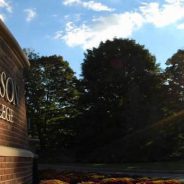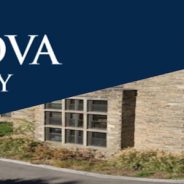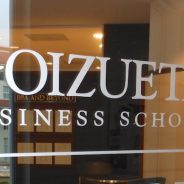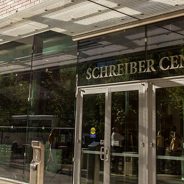Search results for :
MBA Jobs: Corporate Development Associate
Strategy and leadership development are at the core of almost every MBA program. In fact, they’re two of the skills most often mentioned when candidates discuss why they want to go back to school. But when it comes to narrowing down a career path that best takes advantage of those skills, how do you make a decision? If you enjoy mergers and acquisitions (M&A) as well as planning and executing strategies to meet organizational objectives, then you might want to consider a role as a corporate development associate.
With 10-year job growth—through 2022—expected at 41.2 percent, a career as a Corporate Development Associate is an excellent choice for MBA graduates. Continue reading…
Babson’s MBA Program Ranked #1 for Entrepreneurship 24 Years in a Row
For the 24th year in a row, U.S. News & World Report has named Babson’s MBA Program No. 1 for entrepreneurship. This ranking places Babson College’s F.W. Olin Graduate School of Business ahead of Stanford Graduate School of Business (No. 2), Harvard Business School and MIT Sloan School of Management (tied at No. 3), and UC Berkeley’s Haas School of Business (No. 5). Twenty-four years is a long time to lead the world in any area, and to do so in entrepreneurship education—a field that is constantly evolving—requires regular innovation. Continue reading…
Financing Your MBA, Part 2
In the first of our multi-part series on financing your MBA, we took a look last week at the costs involved in attending a top-tier business school. Now, with a better handle on how much money you’ll need, let’s start looking at where that funding will come from.
Students typically rely on a mixture of savings, fellowships and scholarships, employer or outside assistance, and loans to meet the cost of an MBA program. According to the GMAC 2016 Prospective Student Survey, prospective students expect to finance almost half their education through a combination of grants, fellowships and scholarships (26 percent) and loans (20 percent). Other anticipated sources of aid include personal savings, parental support, employer support and spousal or partner earnings.
Meanwhile, estimates from several top programs suggest that between 30 and 50 percent of students receive some form of fellowship or scholarship. For instance, the Stanford Graduate School of Business calculates that 50 percent of its students receive fellowships funds, while New York University’s Stern School of Business states that up to 20 percent of its full-time MBA students receive merit-based scholarships. Harvard Business School (HBS), one of the few schools to solely offer need-based aid, reports that 50 percent of students are eligible for needs-based Fellowships. About half of all HBS students receive approximately $37,000 each year through need-based fellowships, the school says.
The best place to find information about a particular program’s financial aid offerings is the business school’s financial aid office, which may be run by the parent university. Along with providing substantial information about school-based fellowships or scholarships, financial aid officers can also help students navigate the loan application process and secure alternative sources of funding. In addition, free online resources such as finaid.org, scholarships.com or Peterson’s Award Database can provide students with further guidance in financing their degrees.
School-Based Financial Aid
Schools often offer a variety of options to help students pay for their education. These options can include merit- or need-based business school scholarships or fellowships, university-wide scholarships, work-based opportunities such as research assistant or teaching assistant positions, and lists of outside resources. To find out more about a particular school’s offerings, students should refer to the financial aid or cost of attendance section of a school’s website or contact the school’s financial aid office directly.
Merit-and Diversity-Based Fellowships and Scholarships
Most scholarships provided by schools are awarded based on merit, meaning they are offered to students who have demonstrated qualities such as academic excellence, professional aptitude or outstanding leadership. Merit-based scholarships are usually awarded at the admissions committee’s discretion in order to attract the highest caliber students and can cover the full cost of tuition.
To enhance the diversity of a class, private donors, alumni and corporations also can endow a variety of scholarships or fellowships targeted towards applicants with a particular career interest, educational background, nationality, racial or ethnic identity, or gender. In addition, some schools offer financial awards to students who are already enrolled and have demonstrated leadership on campus or exceptional academic ability.
The process of applying for scholarships and fellowships varies by school. In some cases, students are automatically considered for these awards when they submit their applications to an MBA program, with no additional work required. Alternatively, some scholarships and fellowships require an additional essay, submitted either at the time of application to the program or after acceptance. A large majority of merit- and diversity-based awards are time-sensitive or based on a first-come, first-served process, so students are encouraged to apply early in the MBA admissions cycle.
Scholarships provided directly by a school are typically offered on a consistent basis year to year. However, endowed fellowships or private scholarships may not always have funds available. Students applying separately to these scholarships and fellowships should check with the head of each program to ensure they are being offered that year.
Need-Based Awards
Though not as widely available, schools may offer financial aid based on students’ demonstrated financial needs. Certain leading schools, such as Harvard, are notable exceptions to this trend in that all of the fellowships they offer are based on financial need. Need-based aid may come in the form of a grant, which does not need to be paid back, or a low-interest loan.
When deciding whether to offer a student need-based aid, the financial aid office typically weighs the student’s income from previous years; his or her spouse’s financial situation; any assets such as stocks, trust funds or home equity; and other outside funding such as employer assistance. Schools compile this information by either asking students to fill out school-specific forms or, in the case of U.S. citizens and permanent residents, using information found in the Free Application for Federal Student Aid, more commonly known as the FAFSA.
School-Based Work Opportunities
MBA programs typically discourage full-time students from working during their studies. However, some business schools, like Stern, do offer work-based financial assistance, in which students apply to work with professors on research projects or help teach classes in exchange for tuition reimbursements. These opportunities may pay up to $20,000 a year and are usually available after a student has been enrolled for at least a semester.
Loan Repayment Assistance Programs
Loan Repayment Assistance Programs (LRAPs) are designed to encourage students to pursue careers in the public and nonprofit sectors, which generally offer lower salaries than those in the private sector, by offering assistance on loan repayments. While the individual requirements of each program vary by school, LRAPs typically require that a graduate work full-time, receive an income below a certain threshold and demonstrate they required financial aid during their MBA studies. Financial support from these programs varies from covering a certain percentage of a student’s loan to assuming the full cost of a loan payment.
Next up in the series, we’ll provide an overview of private scholarships, as well as public and private loan programs. In subsequent posts we’ll examine options for international students, specific financial aid programs at individual schools and more. So stay tuned.
This article has been edited and republished with permissions from Clear Admit.
Villanova School of Business Enhances EMBA Program
Villanova School of Business’s Executive MBA program is undergoing major revision. The changes are scheduled to be implemented in September 2017. The program is currently 21 months long, but come September, it will be shortened to just 19 months. The new EMBA classes will meet every three weeks, Friday through Sunday, for a total of 22 weekends. The previous EMBA met over the course of 33 weekends.
Students in the revised program will reside and take classes at the Inn at Villanova University. The updated space will have several exciting amenities, including enhanced, state-of-the-art classroom technology, private balconies, a fitness center and high-speed internet. The Inn was designed to encourage peer interaction.
The majority of people pursuing an EMBA have significant work experience, and the enhanced program will afford students the flexibility to tend to their families and careers while pursuing their educations. Villanova’s EMBA is an ideal option for working professionals seeking to change their career path or create more opportunities for advancement at their current job.
According to Thomas Monahan, PhD and founder of Villanova’s EMBA program, the curriculum was designed to promote systems thinking, “…an integrated approach to education, really trying to understand the problem from a multidimensional perspective. Monahan also underscored the program’s emphasis on collaborative learning. One of his priorities has been ensuring that students are in an environment in which “…they are going to learn as much from one another as they did from their classroom experience,” he says.
In building the new program, Villanova’s staff polled executives and did extensive research on other major EMBA tracks throughout the country. Villanova strives to ensure that its curriculum is extremely relevant to the working world and that its faculty is equipped to help executives analyze and attack problems in modern business.
Dual-Degree Programs: Emory’s Goizueta Business School
If an MBA provides a fast track to a highly paid and powerful position in the business world, just think of the boost a specialized degree paired with an MBA could be toward the career of your dreams!
George Washington School of Business Make Huge Splash in New Financial Times Online MBA Rankings
According to a press release on the school website, the Financial Times (FT) has listed the George Washington University School of Business online MBA program as No. 6 in the world in its 2017 survey of “Top 20 Online MBA Programmes.” Continue reading…
Top Scholarships at Columbia Business School
Earning an MBA from Columbia Business School (CBS) is an incredible opportunity. It is no secret that CBS offers an enviable education, but it is also located in the heart of New York City, where MBA students will be surrounded by opportunities and industry giants. Of course, being in the fastest-paced, most populous city in the United States comes at a price. Literally. New York is listed as number one on Investopedia’s Top 10 Most Expensive Cities in the U.S. Luckily, CBS offers a wealth of scholarships to make grad school in the city more manageable.
Merit-Based Scholarships
Merit-based scholarships are an excellent option for motivated students with impressive undergraduate GPAs and work experience. Also, if students do not receive a fellowship in their first year, they will have another opportunity in their second year.
• Forté Foundation Scholarship: The Forté Foundation offers scholarships to outstanding women through their Forte Fellows program. The fellowship exists to encourage larger numbers of women to pursue an MBA education. There is no application information required from students at CBS, as nominees are selected by the school’s director of admissions. Forté Fellows receive multiple benefits, including participation in the MBA Women Leadership and Financial Services FAST Track Conferences. Students in the program are also included in the Forté Fellow resume book, which is distributed to Forté Sponsor companies like J.P. Morgan and IBM Global Business Services.
• Toigo Fellowship: CBS is one of the Robert Toigo Foundation’s featured MBA programs. The Toigo Foundation’s mission is to encourage diversity in finance, so this fellowship is available to under-represented groups. Driven minority students will be eligible for consideration. Fellows attend a weekend summer session to prepare them for business school. During this session, students are assigned mentors to guide them throughout school and their careers.
• Columbia Fellows Program: Columbia Fellows is available only for the first year of the program. The scholarship includes a partial- or full-tuition award for applicants who have shown the creativity and initiative to be true leaders in business.
• Board of Overseers China & India Fellowships: This fellowship is available to students from China and India. Scholarships are awarded by the Board of Overseers, which is comprised of industry giants across a variety of fields.
• Meyer Feldberg Distinguished Fellowship Program: This fellowship is extremely competitive and is granted to students who have shown outstanding leadership skills and academic initiative. Students applying must demonstrate an impressive track record in areas like entrepreneurship and social ventures. Fellows are given full tuition and lifelong membership in the prestigious network of award recipients and donors.
.
• R.C. Kopf Fellowships: The R.C. Kopf Fellowship is granted to students with an interest in international business. Italian, French, British and U.S. citizens can all earn the Kopf Fellowship. Applicants should be accomplished in academia, but also exhibit personal and professional behavior that makes them an asset to the community.
• Gerardo Werthein Scholarship: This scholarship is specifically for MBA students who have lived or studied in Argentina and who are interested in returning to work in Argentina. The scholarship is granted based on financial need.
• Ela Lemelbaum Scholarship: Israeli students are eligible to receive the Ela Lemelbaum Scholarship, which provides tuition support options for both first and second years of study. Preference goes to students who have studied at the Interdisciplinary Center in Herzliya, Israel. This scholarship is renewable during the second year.
Other Scholarship Opportunities
CBS also offers a variety of need-based scholarships to students, which may yield tuition support ranging from $7,500 to $30,000. Need-based scholarships are based on every aspect of a student’s assets. About 50 perfect of applicants are granted need-based awards. These scholarships are automatically renewed during a student’s second year. There is a rigorous four-part application process. Students may also seek out and apply for external scholarships.
Scheller MBA Alumni Develop Successful Startup
Two MBA alumni from the Georgia Institute of Technology – Scheller College of Business have partnered to develop a successful startup thanks to their strong business education.
Stanford MBA Alumni Spotlight: Pete Flint, Trulia
The Stanford Graduate School of Business (GSB) is home to one of the top MBA programs in the country with more than 28,000 alumni spread out around the world. This community is composed of some of the top C-Level alumni and business leaders in the world, which offers MBA students an incredible opportunity to learn from and interact with those who came before. One of those alumni is Pete Flint, the previous founder and CEO of real estate technology firm Trulia and a managing partner at NFX Guild, a startup accelerator. Continue reading…
Opera Singer Explores New Opportunities after Laurier MBA
Twenty-six-year-old Kate Applin was an aspiring opera singer training in Italy and Canada when she decided to attend Wilfrid Laurier University to earn her MBA. It was there, while she completed her one-year program, that she discovered a new passion and enthusiasm for marketing and sustainability and landed a job with Microsoft Canada. Continue reading…
SPU Graduate Competition Judge Shares Insight
A few weeks ago, Seattle Pacific University’s School of Business, Government and Economics hosted a graduate-level social enterprise competition. It was a group contest allowing students to pitch a social enterprise idea to an audience of business men and women with the goal to receive funding to launch. Each group had seven minutes to pitch its idea before judges evaluated them. For Matt Overton, a full-time ordained minister, small business owner and judge, “it was a phenomenal experience,” he said in a blog. Continue reading…
Wharton Professor Lynn Wu Talks Productivity With BBC
The footage of Robert Kelly’s children barging in on his live interview with BBC has over 22 million views on YouTube. The clip has sparked debates about the challenges of working from home. People are raising questions about balancing distractions while working remotely, and the impact of these distractions on client relationships.
The Future of Business: Goizueta Social Enterprise
Over the past few decades, social enterprise—the idea that business can be used to identify and bring about transformative societal change—has emerged as a new way of doing business. As Sally Osberg and Roger Martin explained in the Harvard Business Review, “typically, the aim is to benefit a specific group of people, permanently transforming their lives by altering a prevailing socioeconomic equilibrium that works to their disadvantage.” This hybrid approach blurs the lines between traditional business, government and non-profit sectors, and it’s attracting attention more than ever before.
In recent years, social enterprise has grown into a prominent area of interest for MBA students. In fact, some programs, including the MBA at Emory University’s Goizueta Business School, offer social enterprise as an MBA curriculum concentration as well as programs such as Social Enterprise @ Goizueta, which is open to all students interested in the business of social impact. Continue reading…
Chicago Booth Alumni Spotlight: David Lawee, Google
David Lawee, Canadian born entrepreneur and current Vice President of Corporate Development at Google, is a business titan the Booth School of Business at the University of Chicago is surely proud to call an alum.
3 Of The Most Affordable Atlanta MBA Programs
Though a masters degree is invaluable in today’s market, it might seem counterproductive to accrue massive debt in pursuit of one. The thought of the initial financial strain of getting an MBA can definitely be daunting. In fact, in 2015, a sample taken from just ten of the top-ranked business programs showed that MBA students in those schools had totaled $317.4 million in graduate loans.
Quinlan School of Business Earns Praise In New Part-Time Ranking
According to the newest MBA program rankings from U.S. News & World Report, the Quinlan School of Business‘s part-time MBA program has once again been ranked among the Chicago Metro’s top three programs. Continue reading…
3 Accelerated Boston MBA Programs You Need To Know
Until a formal, worldwide mandate to increase the hours in a day passes or we collectively choose to abide by cyclical rather than linear notions of time, perhaps we can take solace in knowing all of us are part of civilization’s constant race against the clock.
3 Interview Tips to Earn a Job from Wilfrid Laurier MBA
There are many reasons that students chose Wilfrid Laurier University’s Lazaridis School of Business & Economics to earn an MBA. For co-op students, it’s a way to gain more job-relevant experience post undergrad so they can hit the job market running. For part-time students, the MBA is an opportunity to advance their career and break past the proverbial glass ceiling. And for full-time students, it’s a chance to explore a new career path with more fulfillment. In each case, the primary purpose of pursuing an MBA is to achieve your career goals. Continue reading…


















